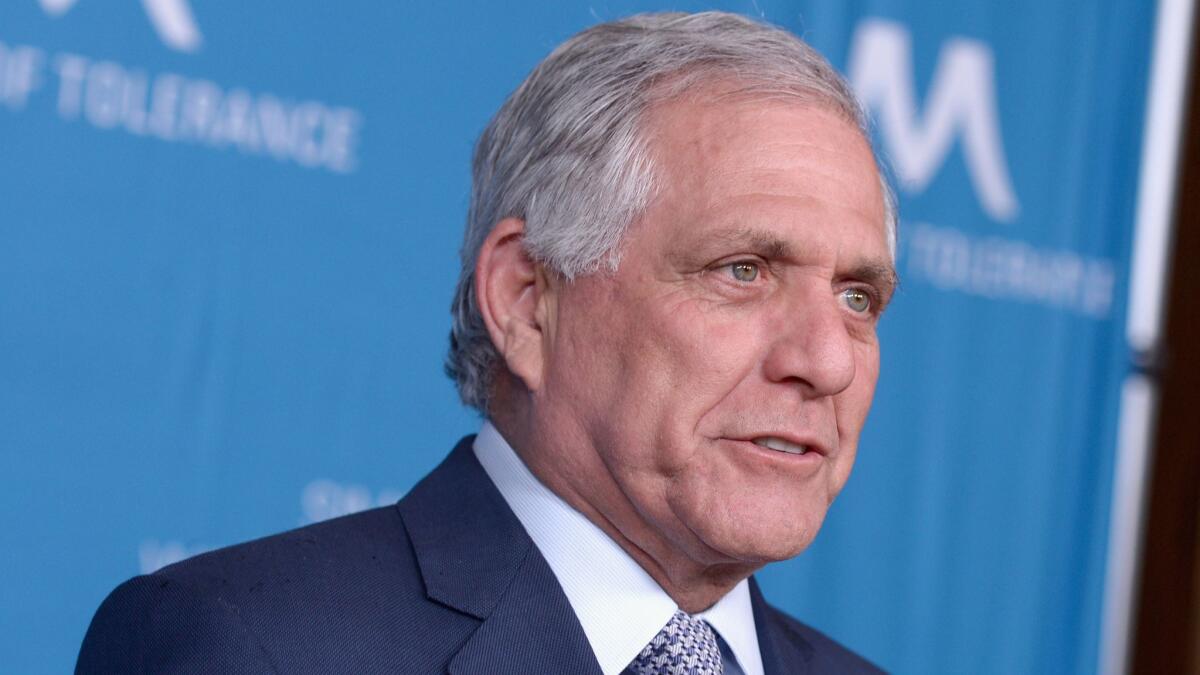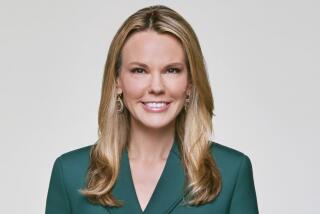Leslie Moonves helped make CBS a TV juggernaut, but the brawl over a Viacom merger could lead to his exit

- Share via
Reporting from New York — CBS unveils its new fall prime-time schedule each spring by hewing to tradition: The presentation always occurs in mid-May, it always takes place at Carnegie Hall and CBS Chief Executive Leslie Moonves always relishes his role as the network’s proud papa.
But there was something different this week as Moonves strode onto the historic stage. Advertisers and entertainment executives who packed the venue rose in a standing ovation. Moonves appeared moved, his eyes glistened.
For TV’s biggest showman, this might be the start of the curtain calls.
Moonves, who is known for an ultra-competitive streak that has driven him to become television’s most successful executive, is locked in the fight of his life for control of CBS Corp. against the company’s powerful controlling shareholders, the Redstone family from Massachusetts.
On Thursday, it was the Redstones who scored the first victory. A Delaware judge refused CBS’ request for a restraining order against the family, which is determined to protect its controlling stake in the venerable broadcasting company.
CBS’ independent board members this week sued the Redstones and their investment vehicle, National Amusements Inc., in an effort to strip away their voting control. Analysts called the maneuver the “nuclear option.”
The move comes as CBS’ independent shareholders have become increasingly concerned that Shari Redstone, the company’s vice chairwoman, might be putting her family’s financial interests ahead of other shareholders’.
The legal skirmish is expected to become a bruising tug-of-war, and it is far from certain which side will prevail.
The Delaware judge, Andre G. Bouchard, indicated that he did not want to be too quick to reel in the family that has had its grip on CBS for 18 years. Bouchard’s reluctance suggests that Moonves and CBS’ effort to unseat the Redstones might be an uphill climb.
“It ain’t over yet,” cautioned Los Angeles investment banker Lloyd Greif, who believes the Redstones’ entanglements with Viacom, and their push for a merger, remain problematic. “Les lives to fight another day.”
Moonves, through a spokesman, declined an interview request Thursday as the company prepared for what was expected to be a contentious board meeting. Board members who are not tied to the Redstones voted to reduce the Redstones’ nearly 80% voting stake in CBS to 17%. That measure won’t take effect anytime soon, as it must survive scrutiny of the Delaware courts. The Redstones, for their part, suggested the vote was moot.
Those who know Moonves think it’s unlikely he would go down without a fight.
“I’m very competitive — I like to win,” Moonves told The Times in 2016. “I’m not a good loser.”
CBS’ winning streak is a hallmark of the boss. CBS has been the most-watched network on television for 15 of the last 16 years, including the current TV season.
The 68-year-old CEO has been calling the shots at CBS with little involvement from the Redstones for the last 12 years. For much of that time, family patriarch Sumner Redstone indulged in the spoils of his vast wealth and allowed his top lieutenants, Moonves and Tom Freston, and then Philippe Dauman — both of whom served as Viacom CEOs — to run his companies as they saw fit.
That changed two years ago, when the mogul — who turns 95 this month — became seriously ill and largely unable to communicate. His daughter, Shari Redstone, took up the mantle, becoming much more involved in corporate affairs.
She has shown a determination to reunite CBS with Viacom Inc. Both were part of the same entity until 2006, when Sumner Redstone tore his media empire apart.
Since early this year, CBS has resisted Shari Redstone’s merger campaign, worried that CBS might falter if saddled with the problems of the weaker Viacom. And Moonves rejected as a nonstarter her demand that her top lieutenant at Viacom, Chief Executive Bob Bakish, have a prominent role at the combined company, such as a seat on the board.
Moonves has a long memory. More than a decade ago, Dauman had a Viacom board seat because he was Sumner Redstone’s attorney. So Dauman was poised to step into the CEO role in 2006 when Sumner Redstone fired Freston.
Just two years ago, the Redstones pushed out several longtime Viacom board members. A few months later, they got rid of Dauman, and Bakish ultimately replaced him.
“History repeats itself,” said one person close to the Redstone family who was not authorized to comment.
Most media industry observers and analysts believed Moonves was dealt a lousy hand when Redstone split CBS and Viacom. CBS was saddled with the mature broadcast TV business, which was facing increased competition from edgy cable channels such as FX and AMC. In the breakup, CBS also received premium channel Showtime, an also-ran to the prestigious juggernaut HBO.
Viacom, in contrast, came away with Paramount Pictures — much to the chagrin of Moonves, who always wanted to run a movie studio. And Viacom’s cable channels MTV, Comedy Central and Nickelodeon had younger and more demographically desirable viewers. Wall Street considered Viacom the growth engine.
CBS, Sumner Redstone figured, would be a stable performer and would produce dividends to satisfy investors.
But in the next dozen years, Moonves not only showed that he had a knack for picking actors for CBS shows that viewers would grow to love, but he also found ways to astutely leverage CBS’ assets. And he ambitiously took advantage of the new media landscape. The emergence of online streaming video and the opening of global markets created a booming demand for TV programming. Moonves used the company’s production studio to fill it.
Under Moonves, CBS has been the most aggressive network when it comes to owning programs on its prime-time schedule rather than licensing them from outside studios. It has turned the broadcast network into a platform to launch shows with broad-based appeal, including “NCIS,” “Blue Bloods” and “Hawaii Five-0,” into properties that could be sold to TV channels around the world, generating billions of dollars in revenue.
Moonves has long said that when developing shows he consults with his international sales team to determine if there will be a market for them overseas.
The emergence of streaming video on Netflix, Amazon and other online sites has created more buyers for CBS programs. Moonves put CBS and Showtime into the streaming business with subscriber-based “over-the-top” digital channels.
Moonves also led the charge to extract revenue from cable and satellite companies for carrying his network-owned stations on their systems. Many people in the media industry scoffed at the notion that the network could get paid for a signal that was available to viewers over the air for free, but Moonves stood firm.
Retransmission revenue and fees CBS collects from its affiliated TV stations have grown and are expected to reach $2.5 billion a year by 2020. It has become a crucial source of revenue that has offset the slowdown in ad revenue resulting from lower TV ratings.
“There are very few people who continue to believe there is a business in broadcasting and Les has been one of them and he’s made it work,” said Steve Mosko, former president of Sony Television. “He’s done a fantastic job.”
Amid the sharp elbows of Hollywood, Moonves also stood out for being straightforward.
“I never had a conversation with him where I didn’t know exactly where I stood — good or bad,” Mosko added.
Preston Beckman, a TV consultant who worked for more than two decades at NBC and Fox, said Moonves has always kept his eye on creating programming that would attract the most viewers, rather than coveting accolades from television critics or Emmy awards.
“I think he’s been successful because he’s never been ashamed or embarrassed by seeing himself as a broadcaster,” Beckman said. “And he’s upheld the showmanship tradition of the business while adapting to the opportunities created by technology.”
Moonves has always seen himself as a scrapper. When he took over in 1996 as entertainment president at CBS, which had fallen on hard times, he was relentless in his attempts to restore the network’s ratings and spiff up its image.
Any perceived slight in the press could prompt a phone call to a reporter or editor, or combative comments written over an article and sent via fax machine. At industry forums, he pugnaciously defended his network and needled his competitors.
In recent years, he has been more buttoned-down as the chief executive of a publicly traded company, but still enjoys holding court with the press. Moonves has been known to micromanage staff members. But they have been rewarded by sharing in the network’s success and are considered the most loyal crew in the media business.
Many of his top lieutenants, such as CBS Entertainment President Kelly Kahl, have worked with Moonves over two decades. Whenever CBS throws a major event for advertisers or the press, the familiar faces seen year after year evoke the feeling of a family wedding or bar mitzvah.
If Moonves were forced to depart CBS, it could have a ripple effect across the executive ranks, as some members of his team might also head for the exit.
Beckman notes that CBS has become a well-oiled machine under Moonves’ veteran staff and could remain that way without him, at least for a while.
“If Les left, that would leave a good big hole,” Beckman said. “But there is a cult over there. He’s trained enough people there that they would carry on.”
More to Read
Inside the business of entertainment
The Wide Shot brings you news, analysis and insights on everything from streaming wars to production — and what it all means for the future.
You may occasionally receive promotional content from the Los Angeles Times.












